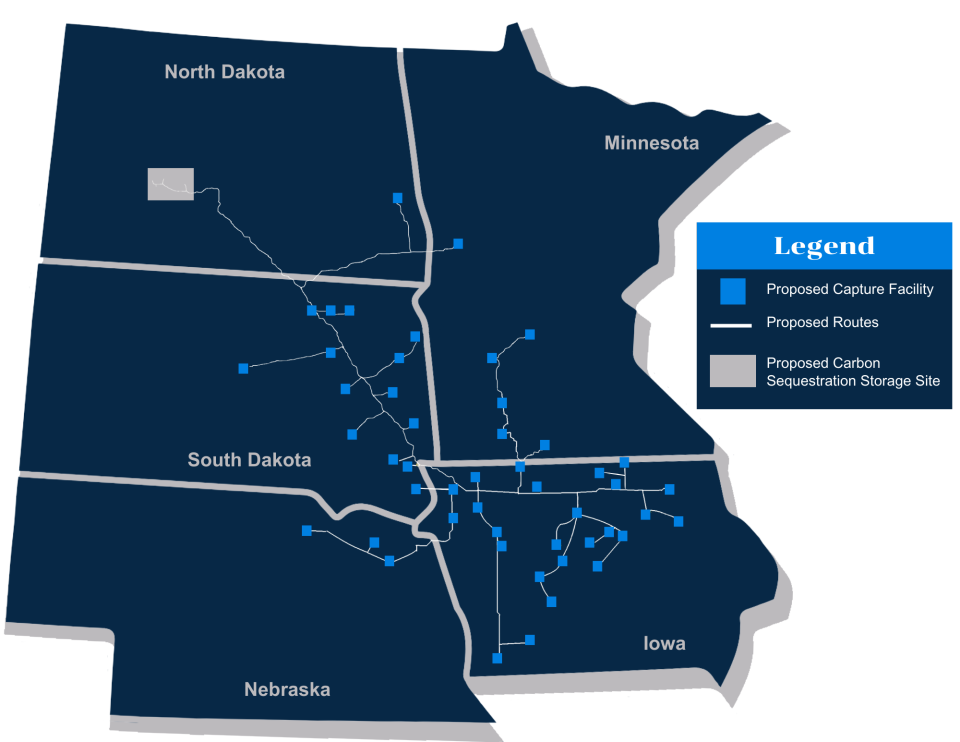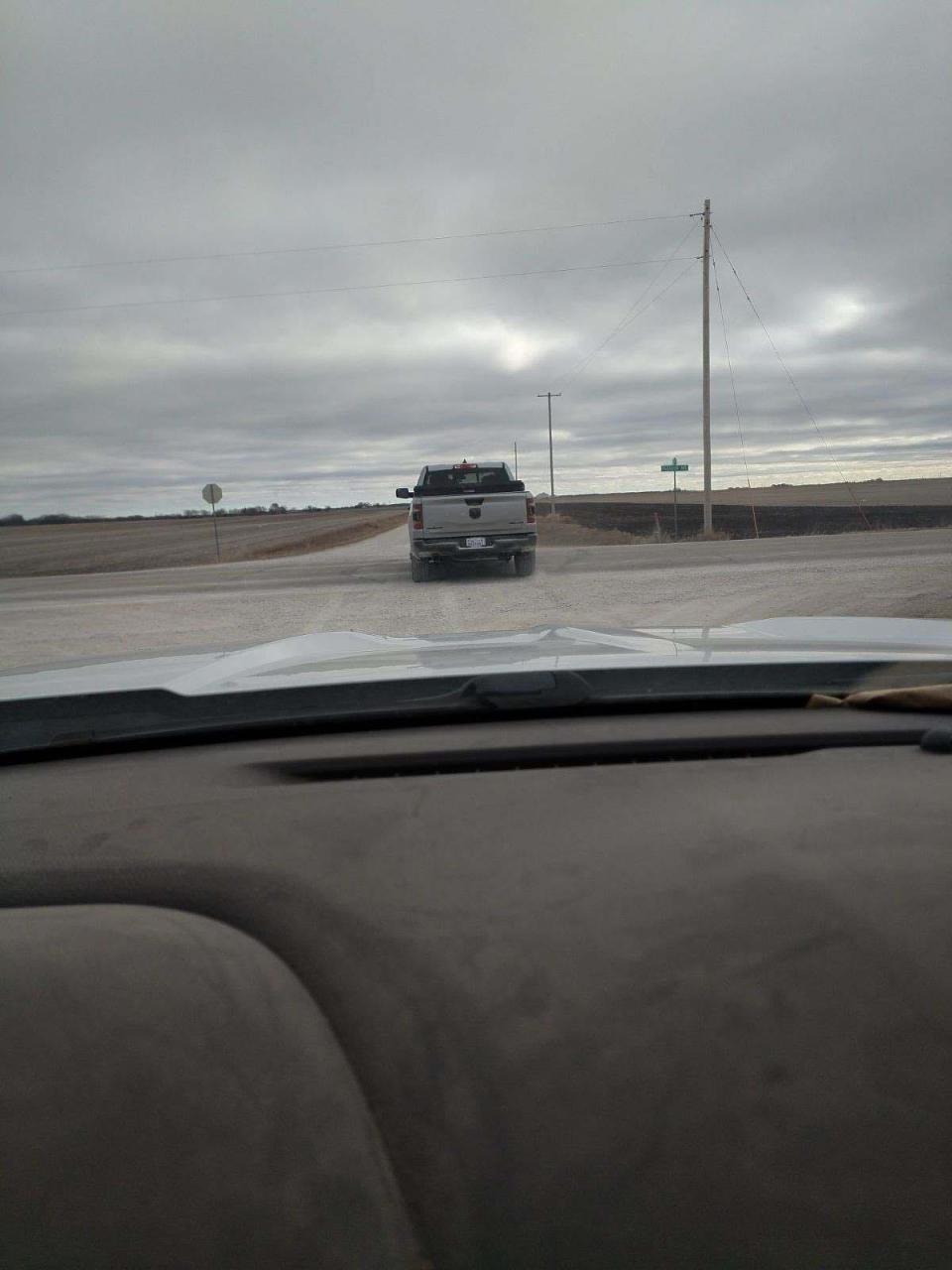Summit Carbon's POET connections 'not finalized' as company eyes defunct Navigator routes
For Summit Carbon Solutions, bringing POET, a Sioux Falls-based worldwide leader in biofuel production, onto their ambitious carbon dioxide pipeline network was practically the deal of the year.
All they need to do is connect A, Summit Carbon's pipeline, to B, POET's ethanol plants. That's easier said than done, especially since Summit Carbon's planned pipeline routes remain up in the air.
Sabrina Zenor, Summit Carbon's communications director, told the Argus Leader on Wednesday all potential pipeline routes meant to connect to POET's ethanol facilities "haven't [been] finalized."

Summit Carbon and POET's partnership, which they jointly announced on Jan. 29, expands the Iowa company's pipeline network with the addition of 17 POET bioprocessing plants — 12 in Iowa, five in South Dakota.
The pipeline company has since updated its project footprint map to include the 17 POET plants joining the line. But none of the proposed routes currently depicted on the map are set in stone.
"The state-by-state map hasn't [been updated] yet because we haven't finalized a route yet," Zenor said in response to a request for comment.
Just as well, an Argus Leader inquiry found that Summit Carbon has been performing "constructability reviews" of currently defunct pipeline routes proposed by Navigator CO2 Ventures, a former rival of the Iowa developer that shuttered its own CO2 sequestration project in October.
Summit Carbon is considering former rival's preestablished POET connections
It makes sense for Summit Carbon to not have a definitive picture of their pipeline route at this time. In South Dakota, the company intends to but has yet to refile for a permit application to build its project after the state Public Utilities Commission denied their first application on Sept. 11.
Summit Carbon said in its Jan. 29 joint press release it will include the South Dakota POET plants in its second permit application.
Summit Carbon also has a pending permit decision in Iowa, which is expected to arrive sometime in 2024. POET's Iowa plants will be included in a separate application, according to Summit Carbon.
However, some of Iowa's Webster County landowners have been on high alert in recent weeks after an unexpected visit from a Summit Carbon employee.
John Williams, one of those landowners, confronted a Summit Carbon construction manager on Feb. 10. Williams told the Argus Leader he noticed a white truck with a "Texas Buyer" temporary license tag perusing near his land, which prompted him to stop the driver and inquire further.
Williams said the Summit Carbon employee didn't give his name but told him Summit Carbon was planning to "convert" easement option agreements made between Navigator and area landowners.

The interaction itself took place south of the town of Burnside in Webster County, near the intersection of 320th Street and Paragon Avenue. According to Navigator's proposed route map, the company's canceled pipeline project would have ran adjacent to 320th Street and crossed under Paragon Avenue.
POET's Gowrie bioethanol plant is 10 miles west of where the interaction between Williams and Summit Carbon took place. Navigator, prior to the cancelation of its project, would have built an offshoot pipe to connect the Gowrie plant to their main pipeline.
Summit Carbon's communications director could not say whether the Iowa company intends to use the old POET connections already drafted by Navigator, but she did confirm the interaction with Williams took place. She also said the Summit Carbon employee was conducting a "constructability review" — a process to determine the feasibility of and identify potential issues associated with a project.
"Whether or not Navigator's route is being incorporated into our route, I couldn't tell you," Zenor said. "I don't have those answers. I'm not privy to those conversations."
Zenor emphasized the unnamed employee had done everything by the book. He had been approached first by Williams and had not entered anyone's property, and Zenor said he had been reviewing the Navigator easements from the road.
"The IUB is not aware of any provision of law which would prohibit anyone from viewing property from a public place," Iowa Utilities Board Communications Director Don Tormey told the Argus Leader.
Summit Carbon's interest in Navigator easements falls within a legal, ethical gray area, critics say
The question of whether Summit Carbon's actions are ethical, however, is one posed by pipeline critics.
Under Iowa law, Summit Carbon and other hydrocarbon developers would have to undergo a rigorous permit process before they can build a pipeline in the state.
The first step of this process requires Summit Carbon to request and hold public informational meetings prior to applying for a permit. From there, developers can file for a construction permit with the IUB, but only when 30 days have passed after their last informational meeting.
Jessica Mazour, Iowa Sierra Club conservation program coordinator, told the Argus Leader on Wednesday the constructability reviews conducted by Summit Carbon pose a transparency issue. She argued the company is "try[ing] to line things up before the public is notified."
"If they have a better idea of where they're actually going, even though they might not have a certain route, they have the heads up in a community to try to get buy-in before any local opposition because local opposition is not notified," Mazour said. "There's a lot of newly impacted counties on this Phase 2 route … It creates an unfair advantage."
Zenor contends they never broke any laws.
"That's what constructability reviews are for. It's for them to, you know, go see it, see if you can put a pipeline there," Zenor said.
Part of Mazour's concerns over Summit Carbon's interest in Navigator's easements lie in what Iowa law does say and what it does not.
It's virgin territory, Mazour said, for one pipeline developer to be in a position to subsume another company's easements.
For landowners who signed agreements with Navigator, Mazour said there's room for Summit Carbon to take advantage of some legal loopholes.
In particular, the provision of the law that covers hazardous liquid pipeline storage facilities requires Summit Carbon to hold public informational meetings "in each county in which real property or property rights will be affected," Tormey said.
But the IUB spokesperson did not elaborate on whether a pipeline company — in this case, Summit Carbon — needs to hold informational meetings for in counties where easements obtained by another exist — potentially, Navigator.
"If someone's already signed an easement, does that fit the same law as they cannot start easement negotiations until after the informational meetings have been held?" Mazour said. "I don't know how that will work. I guess we've never been in this situation where they're going to need new easements and then they're also going to need some of Navigator's."
Williams, who is staunchly opposed to the recent pipeline proposals in the state, did not sign an easement agreement with Navigator. He said his Webster County neighbors are "oblivious" to Summit Carbon's recent interest in Navigator's easements.
"It creates this, you know, uncertainty in people's minds and they don't deserve to live with it," Mazour said. "They deserve full transparency of, hey, all of you people who are on the navigator line who have signed an easement, we're going to be reassigning that to summit like they should know what's going to happen with their easement.
In October, Elizabeth Burns-Thompson, former Navigator Vice President of Government & Public Affairs, told the Argus Leader the agreements they signed with landowners were not considered "full easements" and would expire after a few years.
However, according to Navigator's sample easement agreement filed with state regulators, the company maintained the "right to assign, sell, lease, mortgage or otherwise transfer" their voluntary easements.
At the time, Burns-Thompson said the company does not "have plans at this point … to sell those options."
Zenor couldn't confirm whether Summit Carbon will try to acquire some or all of Navigator's easements. But she said the company's going to need a route to the partnered POET plants regardless.
"We have to find a route that works for our pipeline to every plant that we have now partnered with 51 across five states," Zenor said. "That's what we're going through the motions of."
This article originally appeared on Sioux Falls Argus Leader: Summit's POET plans 'not finalized' as company eyes Navigator routes

